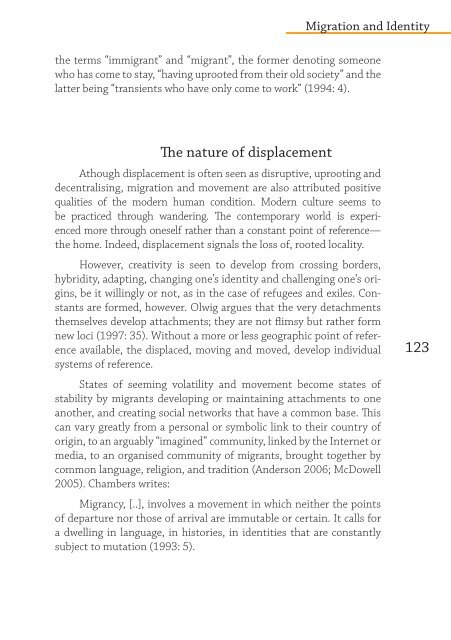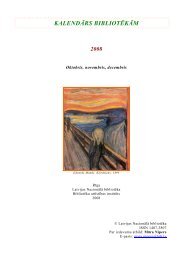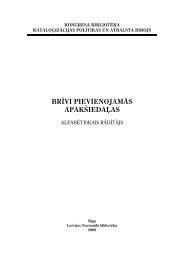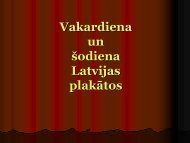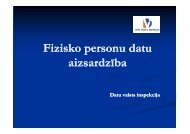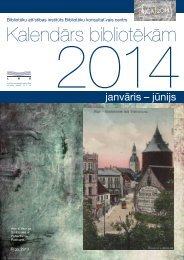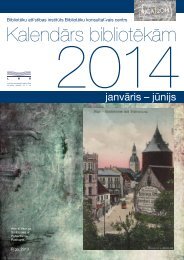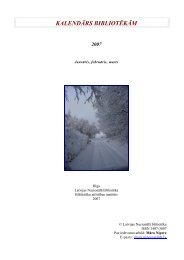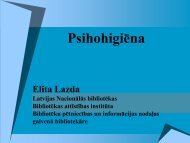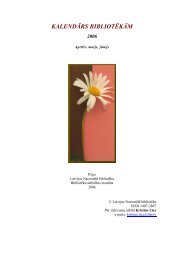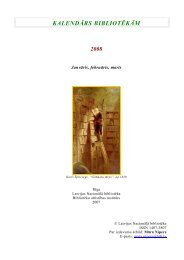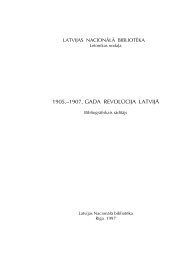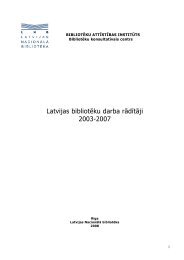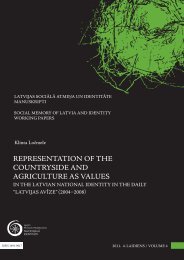- Page 2:
ISBN978-9984-624-79-2ORAL HISTORY:M
- Page 6 and 7:
Marta Kurkowska-Budzan. “From Wil
- Page 8 and 9:
Baiba BelaInstitute of Philosophy a
- Page 10 and 11:
Migration as a Catalyst for Valuesi
- Page 12 and 13:
Migration as a Catalyst for Valuest
- Page 14 and 15:
Migration as a Catalyst for Valueso
- Page 16 and 17:
Migration as a Catalyst for Valuesi
- Page 18 and 19:
Migration as a Catalyst for ValuesW
- Page 20 and 21:
Migration as a Catalyst for Valuesl
- Page 22 and 23:
Migration as a Catalyst for ValuesI
- Page 24 and 25:
Migration as a Catalyst for ValuesI
- Page 26 and 27:
Migration as a Catalyst for Valuesb
- Page 28 and 29:
Migration as a Catalyst for ValuesC
- Page 30 and 31:
Migration as a Catalyst for ValuesH
- Page 32 and 33:
Migration as a Catalyst for ValuesL
- Page 34 and 35:
Migration as a Catalyst for ValuesI
- Page 36 and 37:
Migration as a Catalyst for ValuesL
- Page 38 and 39:
Migration as a Catalyst for Valuesi
- Page 40 and 41:
Migration as a Catalyst for ValuesF
- Page 42 and 43:
Migration as a Catalyst for Valuesa
- Page 44 and 45:
Migration as a Catalyst for Valuest
- Page 46 and 47:
Migration as a Catalyst for Valuesu
- Page 48 and 49:
Migration as a Catalyst for Valuest
- Page 50 and 51:
Migration as a Catalyst for ValuesT
- Page 52 and 53:
Migration as a Catalyst for Valuest
- Page 54 and 55:
``MIGRATION AND NARRATION
- Page 56 and 57:
Migration and Narrationin 1991. The
- Page 58 and 59:
Migration and NarrationDocumenting
- Page 60 and 61:
Migration and Narrationweek-long cu
- Page 62 and 63:
Migration and NarrationSome couples
- Page 64 and 65:
Migration and NarrationAfter one pe
- Page 66 and 67:
Migration and NarrationConclusionsB
- Page 68 and 69:
Migration and NarrationHinkle, M.,
- Page 70 and 71:
Migration and Narrationshape and to
- Page 72 and 73: Migration and Narrationfor example,
- Page 74 and 75: Migration and Narrationmoving to to
- Page 76 and 77: Migration and Narrationterritory, c
- Page 78 and 79: Migration and Narrationworked elsew
- Page 80 and 81: Migration and NarrationThere was mo
- Page 82 and 83: Migration and NarrationIlze Akerber
- Page 84 and 85: Migration and Narrationthe state bo
- Page 86 and 87: Migration and NarrationKaren Worcma
- Page 88 and 89: Migration and NarrationThe fact tha
- Page 90 and 91: Migration and NarrationAnu KorbEsto
- Page 92 and 93: Migration and Narrationseveral coun
- Page 94 and 95: Migration and Narrationtoday, a mil
- Page 96 and 97: Migration and NarrationThey wouldn
- Page 98 and 99: Migration and Narrationgot so big:
- Page 100 and 101: Migration and Narration“Well is h
- Page 102 and 103: Migration and Narrationand right aw
- Page 104 and 105: Migration and NarrationKorb, Anu, 2
- Page 106 and 107: Migration and Narrationunfortunate
- Page 108 and 109: Migration and Narrationrefutations
- Page 110 and 111: Migration and Narration2000, p. 212
- Page 112 and 113: Migration and NarrationThey had a s
- Page 114 and 115: Migration and Narrationthe Kuba his
- Page 116 and 117: Migration and Narrationconcerns. Wh
- Page 118 and 119: Migration and NarrationReferencesBo
- Page 120 and 121: Arta AnkravaDepartment of Sociology
- Page 124 and 125: Migration and IdentityTransformatio
- Page 126 and 127: Migration and Identityfeel strongly
- Page 128 and 129: Migration and IdentityAivars admits
- Page 130 and 131: Migration and Identityoriginally ex
- Page 132 and 133: Migration and Identitystill somewha
- Page 134 and 135: Migration and IdentityPutting the d
- Page 136 and 137: Migration and IdentityConstants can
- Page 138 and 139: Migration and IdentityAivar Jürgen
- Page 140 and 141: Migration and Identity2) abandoning
- Page 142 and 143: Migration and Identitybeen passed d
- Page 144 and 145: Migration and IdentityEstonians fro
- Page 146 and 147: Migration and Identityrole. In this
- Page 148 and 149: Migration and IdentityConclusionOn
- Page 150 and 151: Migration and IdentityMarta Kurkows
- Page 152 and 153: Migration and Identitybetter and ri
- Page 154 and 155: Migration and Identity(both in a lo
- Page 156 and 157: Migration and Identitydressed in tr
- Page 158 and 159: Migration and Identitysort of exper
- Page 160 and 161: Migration and IdentityMara ZirniteI
- Page 162 and 163: Migration and Identity162Brothers i
- Page 164 and 165: Migration and IdentityThe key word
- Page 166 and 167: Migration and Identitymother was se
- Page 168 and 169: Migration and IdentityKaliningrad d
- Page 170 and 171: Migration and IdentityToday there i
- Page 172 and 173:
````NARRATING MIGRATION IN NORDICCO
- Page 174 and 175:
Narrating Migration in Nordic Count
- Page 176 and 177:
Narrating Migration in Nordic Count
- Page 178 and 179:
Narrating Migration in Nordic Count
- Page 180 and 181:
Narrating Migration in Nordic Count
- Page 182 and 183:
Narrating Migration in Nordic Count
- Page 184 and 185:
Narrating Migration in Nordic Count
- Page 186 and 187:
Narrating Migration in Nordic Count
- Page 188 and 189:
Narrating Migration in Nordic Count
- Page 190 and 191:
Narrating Migration in Nordic Count
- Page 192 and 193:
Narrating Migration in Nordic Count
- Page 194 and 195:
Narrating Migration in Nordic Count
- Page 196 and 197:
Narrating Migration in Nordic Count
- Page 198 and 199:
Narrating Migration in Nordic Count
- Page 200 and 201:
Narrating Migration in Nordic Count
- Page 202 and 203:
Narrating Migration in Nordic Count
- Page 204 and 205:
Narrating Migration in Nordic Count
- Page 206 and 207:
Narrating Migration in Nordic Count
- Page 208 and 209:
Narrating Migration in Nordic Count
- Page 210 and 211:
Narrating Migration in Nordic Count
- Page 212 and 213:
``MIGRATION AND TOTALITARIANREGIME
- Page 214 and 215:
Migration and Totalitarian Regime30
- Page 216 and 217:
Migration and Totalitarian RegimeHo
- Page 218 and 219:
Migration and Totalitarian Regimebu
- Page 220 and 221:
Migration and Totalitarian Regimeis
- Page 222 and 223:
Migration and Totalitarian RegimeMa
- Page 224 and 225:
Migration and Totalitarian Regimeof
- Page 226 and 227:
Migration and Totalitarian RegimeMe
- Page 228 and 229:
Migration and Totalitarian RegimeTh
- Page 230 and 231:
Migration and Totalitarian Regimeem
- Page 232 and 233:
Migration and Totalitarian RegimeAn
- Page 234 and 235:
Migration and Totalitarian Regimean
- Page 236 and 237:
Migration and Totalitarian RegimeBu
- Page 238 and 239:
Migration and Totalitarian Regimeso
- Page 240 and 241:
Migration and Totalitarian Regimeth
- Page 242 and 243:
Migration and Totalitarian RegimeFi
- Page 244 and 245:
Migration and Totalitarian Regimeye
- Page 246 and 247:
Migration and Totalitarian Regimepr
- Page 248 and 249:
Migration and Totalitarian RegimeHi
- Page 250 and 251:
Migration and Totalitarian Regimema
- Page 252 and 253:
Haanpää RiinaUniversity of Turku,
- Page 254:
National Oral History Archive at th


